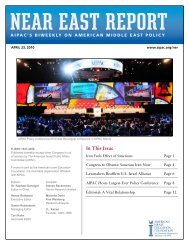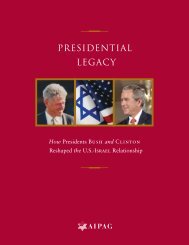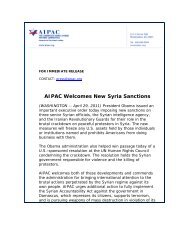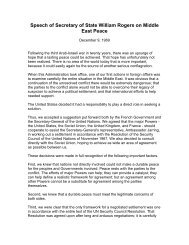2013 Briefing Book - Print Version - Aipac
2013 Briefing Book - Print Version - Aipac
2013 Briefing Book - Print Version - Aipac
You also want an ePaper? Increase the reach of your titles
YUMPU automatically turns print PDFs into web optimized ePapers that Google loves.
WHY ISRAEL MATTERS<br />
Israeli agriculture techniques and technology, such as drip irrigation, have helped farmers around the globe,<br />
especially in Africa.<br />
Drip irrigation has become popular with fruit and vegetable growers in dry weather areas,<br />
from Southern California to the Middle East. The world’s first surface drip irrigation system<br />
was developed in the 1960s at Kibbutz Hatzerim near Beersheba. Similarly, Israeli scientists<br />
have developed genetically modified, disease-resistant bananas, peppers and other crops that<br />
are expanding the world’s food supply and helping to keep prices down at grocery stores<br />
around the globe.<br />
When Israel was founded, it experienced severe difficulties in agriculture production and even<br />
instituted a food rationing policy. Now that Israel has “made the desert bloom,” the Jewish state<br />
is helping others through a series of agriculture programs that include human capacity building,<br />
research cooperation, demonstration farms and agribusiness consulting centers. Israel has also<br />
established an African Growth Market, which seeks to provide higher yields of crops in arid areas<br />
through crop variation and a drip irrigation system. Israeli scientist Dr. Daniel Hillel won the<br />
2012 World Food Prize for his development of an irrigation system called micro-irrigation that<br />
allowed for conservation of water and food to be grown in some of the world’s most arid climates.<br />
The Binational Agricultural Research & Development Foundation (BARD) connects U.S. and<br />
Israeli researchers in the development of agricultural technologies with global significance.<br />
Created in 1977, BARD has funded more than 1,100 projects, investing roughly $400 million<br />
in basic and applied science. Breakthroughs in arid land resource management, food safety and<br />
environmental protection are but a few of the many developments facilitated through BARD.<br />
The Foundation also hosts international workshops to ensure that others are able to benefit<br />
from these discoveries.<br />
30








